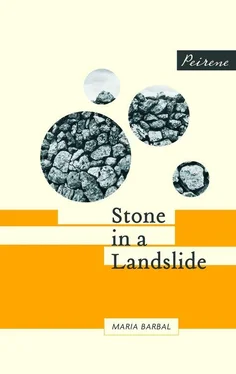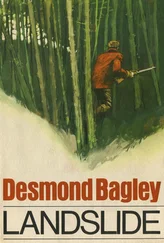When I told Tia about this the next day, her face was unmoved but her eyes betrayed her. I think it was then that Jaume began to win her over, but in secret.
The days were flying by. I still hadn’t learnt what it meant to be a mother with Elvira at one year old and I’d already noticed my belly showing the second child was on the way. Maybe this time it would be a boy. I don’t know why that was what everyone worried about most. An heir. And I didn’t know if I wanted a boy because the general feeling was better a boy than a girl, or if I just wanted one. To have a girl and a boy, one of each.
A boy will be a man. And a man has the strength to deal with the land, the animals, to build. But I didn’t see it so clearly. When I thought about the families I knew well, I saw the woman as the foundation stone. If I thought about my home, it was my mother who did all the work or organized others to do it. Not to mention Tia. The woman had the children, raised them, harvested, took care of the pigsty, the chicken coop, the rabbits. She did the housework and so many other things: the vegetable garden, the jams, the sausages… What did the man do? Spent the day doing things outside. When a cow had to be sold. When someone had to be hired for the harvest. It wasn’t obvious that the man did more or was more, but everyone said, What is a farm without a man? And I thought, What is a house without a woman? But what everyone had always said weighed on me. I only knew that I wanted a boy.
It was certainly more difficult doing everything pregnant. Jaume helped me a lot, but he was away a lot, too. In the winter, whole weeks at a time. Elvira and I — she in particular — lived between the joy of seeing him every Saturday and the sadness of seeing him leave every Monday. Since he spent so much time away, he knew many people. Often at home I saw him looking absent, and when I asked him what he was thinking about, I was disappointed to learn that it wasn’t me or Elvira or the new baby about to arrive. He would say: Nothing, or I was thinking of this or that house in Montsent or Sarri where they need such and such done and how little it would cost them to do it if… then he would look at me and stop talking, stroke my hair as if I were a little girl and decide that there was something he needed to do. Just having him present wasn’t enough for me. I wanted satisfaction, to work out his secrets and all that I believed he only half explained, but there was no time for us to be alone. There was always some work to be done, there was always someone to see. Maybe he didn’t feel this way, but I didn’t dare ask him in case he laughed at my worries as silly.
Sometimes I spoke to Delina about it. Our friendship continued despite the fact that her parents had fallen out with my aunt and uncle about when to water the Fontnova vegetable garden. Delina saw things very differently to me. She believed that all men are the same, that when they have a wife safe and secure at home, they forget her. That the illusion of love only lasts two days and there’s no need to make it more complicated. I didn’t see it like that, but I didn’t know how to explain myself, how to argue against her. I only wondered how she could be so sure of herself if she didn’t even have a sweetheart. She seemed to hold a grudge against men because they hadn’t realized what she was: a woman from head to toe, clever, hard-working and more or less as poor as everyone else. She had a point.
But with me, Jaume had made me somebody, and I felt gratitude mixed in with my love for him. Other people often annoyed me, even the children sometimes. Work, yes, it made me feel alive, stopped me complaining and left me unable to think. But when Elvira awoke crying in the night and I’d calmed her, I couldn’t go back to sleep. I would lie thinking, going from my earliest memories as a child in Ermita to Jaume’s face smiling at me for the first time in Montsent from his father’s cart, with the following day’s work passing in and out of my thoughts, muddled and messy. And just when I felt I was dropping off, Tia would wake me, surprised that I hadn’t yet lit the fire.
Our neighbours on one side were the strangest people in the village. The family was made up of a father, more or less Oncle’s age, two daughters and a son-in-law. Soledat was already middle-aged, and Tereseta had married poor Lluís two winters before Jaume and I got married. The mother had long since died, before I came to live with my aunt and uncle. Her name was Trinitat, and while she was alive her husband was as timid as a mouse. People said that she had been a woman of few words and it was even rumoured that she was a witch. She never went outside and she was only ever glimpsed spying from a corner of one of the windows, or from the open balcony when the weather was fine. People were afraid of her, but in desperate cases they’d ask her advice. She would recommend potions and say prayers. Those who had been up the very long staircase to the first floor didn’t want to say anything when they came back out. A good friend of Tia’s had told her that it was as dirty as a farmyard up there — dried herbs hanging everywhere, and when she left she’d seen a raven’s claw stuck to the door that made her blood run cold.
But once Trinitat was dead, the husband began to tell all the people who had nothing to do in the plaza, the old people like him and the children, that his daughters, starting with the eldest, had a claim to the throne of England. You can imagine how this news spread through the village, completely mixed-up, because to begin with few people had the faintest idea where he meant. Instead of accepting that he was mad, his daughters followed their father in everything he did and became furious when children openly mocked Soledat as Queen Soledat. Tereseta, who was one step further away from the crown than her sister, didn’t become quite so angry but tried to set her husband on Soledat’s tormentors, shouting herself hoarse from the street for him to come. This provoked even more riotous mocking. Poor Lluís would suddenly become as deaf as a post and when his father-in-law went out into the street, he would find himself a job far away in the sty or vegetable garden. Then he would come back late for dinner that day too. Not a soul would have denied that he was the hardest-working man in the whole village.
What is certain is that Soledat scared the children and more than once nearly managed to knock one down when she was chasing them. She must have been nearly forty, tall and skinny, with her hair pulled back into a little bun right on top of her head. Her sunburnt face was creased with many wrinkles and she had two small eyes which were constantly alert. When autumn came, she would put on a black scarf which covered her hair and part of her forehead. Nothing in the world would make her take it off until it was summer again. Both she and Tereseta were sullen women who had nothing to do with anybody except to start disputes that ended in a lifelong enmity. When they dug their heels in, no one could budge them.
I was going heavily up the steps with a bundle of grass for the rabbits. Soledat noticed me from the balcony and saw that I was pregnant. I had to listen as she said, Again, already? and that Jaume and I were very busy workers, with a laugh that made the blood rise to my cheeks. And then, fixing me with her magpie eyes as if she were looking inside me, she told me in pained terms: It will be another girl.
She arrived along with the spring of 1923. It was the last day of March, when the ground was still frozen every morning. We called her Angeleta.
Apart from the elder sister’s jealousy of the younger, the next six years at home were good ones. The worry I sometimes felt about Jaume was passing. I don’t know if our daughters united or separated us: certainly it often seemed to me that we loved each other through them. When I took the cows to graze in the Solau meadows, the mad, wild joy of falling in love with Jaume, a paradise lost, would slowly knit back together in my memory, stitch by stitch. I couldn’t imagine heaven as Monsignor Miquel described it. For me, it was just that strange force which changed my world.
Читать дальше












